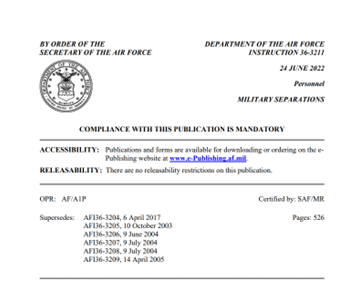USAF discharge rules for sex offenders
In a recent press release, the Air Force announced the update to DAF Instruction 36-3211: Military Separations where the USAF discharge rules for sex offenders have changed. The DAF said the update was necessary to clarify the discharge instructions with regards to Airmen accused of sexual assault. Airmen and Guardians whose sexual assault offenses are founded by investigation and or courts-martial conviction were always subject to mandatory discharge. However, there were some exceptions to discharge in the old policy. These exceptions are now strictly limited. The new policy updates the criteria and the USAF makes rule changes for the discharge of sexual offenders. Citing a zero-tolerance policy on sexual assault and sexual harassment, the Department of the Air Force said it was working to achieve a safe environment for Airmen, Guardians, and civilians. For this reason, the USAF makes discharge rule changes for sexual offenders. The previous Air Force regulation regarding separations was AFI 36 3208 and now incorporated into AFI 36 3211.
What are the changes in discharge policy for sexual offenders?
The new departmental policy outlines strict and specific exceptions to the presumption of discharge. Limited circumstances must exist for a service member to be considered for exception. The new rules make clear that exceptions are disallowed for the following reasons:
- if the sexual assault was committed against a child, if abuse of authority is presumed to be present, or
- If a member has a prior substantiated allegation of sexual assault or sexual harassment.
The abuse of authority presumption will be a big factor. Article 93a Prohibited activities with a recruit or a trainee by a person in a position of special trust is an offense under the UCMJ. Service members who fraternize and assume they are having a consensual sexual relationship with someone in their charge will be mandatorily discharged with out exception. This new Instruction has strengthened the rules for discharge for sexual offenders. The general instruction for Air Force Separations can be found is AFI 36 3211, previously AFI 36 3208.
What considerations for discharge are not allowed?
In the previous iteration of this instruction, there was criteria that allowed separation authorities to consider whether or not a service member was likely or unlikely to engage in a future act of sexual assault. The updated instruction removes this consideration as the DAF determined this consideration to be subjective. There are also several other factors separation authorities and separation board members are no longer allowed to consider:
- Personal, family, or financial circumstances
- Good military character or service record
- Medical or mental health condition
The DAF has proposed increased funding in its fiscal year 2023 budget regarding sexual assault and integrated violence prevention programs. It also incorporated the provisions from AFI 36 3208 into AFI 36 3211 Military Separations.
A link to a chart comparing the old criteria with the new criteria can be found here.
For more information on this offense including the maximum punishment, potential defenses, and a discussion of the strengths and weaknesses of the prosecution’s case, consult with an experienced military lawyer.







